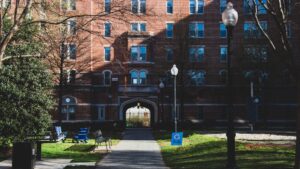GUSA’s Accessibility Policy Team has launched a campaign for the establishment of a Disability Cultural Center (DCC) that would support the disabled community on Georgetown’s campus. Three members of the team, Nesreen Shahrour (NHS ‘23), Gwyneth Murphy (SFS ‘23), and Dominic DeRamo (COL ‘23), released a petition calling for the establishment of a DCC on Dec. 23.
The DCC would be a university-funded center, consisting of a full-time director and student employee, that would coordinate educational, academic, social, and support programming for Georgetown’s disabled community and their allies. Crucial to the goal of the center is providing a space for building community and affirming that the disabled community has a culture of their own.
“I think one of the reasons that this center was ignored when the Women’s Center and the LGBTQ+ Center and the CMEA were prioritized is because people don’t think that disabled students have culture, that disabled culture exists, but it does,” Murphy, who serves on GUSA’s Mental Health Policy Team as well as the Accessibility Policy Team, said.
According to Murphy, the Accessibility Policy Team’s goal is to gather 1,000 signatures on the petition. “What I’m hoping we’ll see from that is that people are willing to expand their idea of inclusion to better represent and include disabled students,” she said.
As of Jan. 5, the petition has acquired signatures from over 570 Georgetown students and alumni, more than 70 clubs and organizations, and other groups, including students and organizations from other universities.
When Georgetown went online in March of 2020 due to the COVID-19 pandemic, it became clear that the disabled community on campus was particularly impacted by the shift. Students’ academic accommodations were not respected or implemented by some professors in the virtual environment, even more so than on campus.
“During the summer, we recognized that there needs to be a resource, specifically a disability culture center, for students with disabilities on campus,” Shahrour, the Accessibility Policy Chair, said. Advocacy for greater accessibility quickly followed. According to Murphy, the team wanted to take advantage of the winter break to take their push public.
The team launched a media campaign in tandem with their petition to gather signatures and support for the cultural center, sharing infographics on Instagram. The GUSA Accessibility Policy Team released their proposal for the DCC on Dec. 31, which outlines the details of the cultural center and includes the history of the push for a DCC, information about peer-universities, and student testimonials.
The history of advocacy for a DCC at Georgetown goes back to the leadership of Lydia X. Z. Brown (COL ‘15), now a professor in the College and a renowned disability justice advocate. Brown led the push for a DCC throughout their years as a student, creating a website and university proposal and amassing lists of supporters, according to DeRamo. Despite momentum for Brown’s proposal in 2015, when they were serving as the GUSA Undersecretary for Disability Affairs, the center has yet to be created. At the time, few universities were committing themselves to supporting disabled students through community centers.
“Unfortunately, the university at the time was just not super receptive of it,” DeRamo said. “When Lydia was originally making efforts to get a DCC at Georgetown, there were only three universities in the entire nation who had a Disability Cultural Center.”
Since Brown’s efforts over five years ago, more than five universities have developed DCCs, with many more planning to create one. “In a short time period, many more universities are recognizing the need for a Disability Cultural Center, and that’s really exciting,” Shahrour noted.
As the proposal states, Duke University and Stanford University are currently planning to establish DCCs. Syracuse University, a long time rival of Georgetown’s, already has one.
“We are talking about some well-known universities, who are well-renowned, who are leading this front,” said DeRamo. “Part of Lydia’s push was recognizing the fact that Georgetown could be leading this effort, could be leading in disability, and could be leading in inclusion, but because of certain barriers that the university has set up, we have not created these things.”
While Georgetown’s disabled students and their allies have found homes in various clubs and organizations on campus, like the Georgetown Disability Alliance (GDA), GU Signs, and Best Buddies, there is currently no institutionalized place for them to build community. Instead, there is a fragmented community spread out across individual student-run organizations.
“There’s an entire club culture for disability that’s existing without an overseeing body,” Murphy said, noting that this issue could be fixed with the establishment of a DCC. “We would be able to coordinate with all mental health organizations on campus and disability organizations on campus.”
According to Murphy, part of the reason why a DCC hasn’t been created yet is that the Academic Resource Center (ARC), along with other health centers on campus, are thought to already serve the needs of Georgetown’s disabled student body. While the ARC often has been at the center of accessibility and accommodation concerns, particularly during the transition to online learning, it is not only understaffed, but it does not function as a cultural center.
“The ARC solely assists with academic and housing needs. And that is not disability culture,” Murphy said. “In fact, that ignores disability culture, because it says the only thing that disabled students need are academic resources and housing, which is not the case.”
When DeRamo, who also serves as the co-chair of community for GDA, was first learning about the DCC, he was concerned there would be overlap in GDA and DCC’s purpose. He realized that as a student organization, GDA is limited in funding, time, and resources. “There needs to be some university-level support on that front, at an administrative level,” DeRamo said
Coming to Georgetown and joining GDA, DeRamo has learned that there are shared experiences among the disabled community which have uniquely impacted their lives. The opportunity for the disabled community to be able to share those moments with each other is what would make a DCC so valuable, according to DeRamo.
“The experiences of people discrediting you and constantly questioning your identity and questioning your own sanity at times is some of the shared experiences that we have, and to be able to talk about both the good and the bad is why we need a Disability Cultural Center,” DeRamo said.
The establishment of a DCC would also be an opportunity for the university to commit to disabled students. According to DeRamo, disability is not often at the top of Georgetown’s list. “What we’re seeing at a university level, whether it’s among students, whether it’s among faculty, whether it’s among administrators, is that disability is never prioritized,” he said. “Disability is always seen as something that needs to somehow take second place to some other issue.”
As a result, the disabled community often has to individually fight for their needs. “Disabled students are left to advocate for themselves, by themselves. And that’s always the expectation,” Murphy said. “Part of the times that I have needed something like this has been times where I felt like I had to advocate for myself by myself.”
“We need one chance to be able to have someone do something for us, one opportunity for a center to take off some of that pressure, some of that weight off our shoulders, and give us an opportunity to just be students and not student advocates 24/7,” she added.
According to Shahrour, the DCC would put the disabled community on par with other communities on campus, such as the LGBTQ+ Resource Center, the Women’s Center, the Center for Multicultural Equity and Access, and the Center for Social Justice. Further, Georgetown’s support of a DCC would cement it’s dedication to the university’s values.
“Georgetown has a stated commitment to diversity, serving others, and educating the whole person. So establishing the DCC will demonstrate this commitment by recognizing the need for some sort of institutional affirmation of disabled people on campus,” Shahrour said.
The team plans to schedule meetings with members of the administration in the coming months, first with Vice President of Student Affairs Todd Olson to learn about any reservations with the project so they can edit their proposal accordingly, followed by an official meeting with the administration. They anticipate that this will be a long process.
“We are not going to get a Disability Cultural Center overnight, this is going to take months, if not years,” DeRamo said. He noted that the team recognizes the establishment of a DCC will require funding, space, and allocating resources when other important facilities on campus, such as the ARC and the Women’s Center, are already under-resourced and understaffed. He hopes that efforts for the DCC will work in tandem with increased support for these other spaces as well.
These efforts, however, are made in the hopes of establishing long-lasting disability resources at Georgetown. “We’re striving for something institutional, that could be dedicated to the lived experiences of disabled people, and encourages continued conversations throughout the years,” Shahrour said.
Until then, the team hopes for continued activism for the disabled community, and that this momentum doesn’t go away. “I think that there’s been a change in the last semester or so of people finally noticing disability advocacy and justice work,” Murphy said. “And I hope it doesn’t die out. And I hope that this cultural center is the beginning of something amazing. And it’s the beginning of finally having inclusion, true inclusion, and that demands the inclusion of people who are disabled.”







